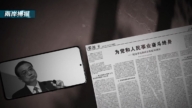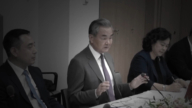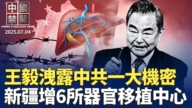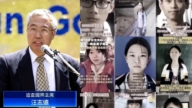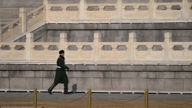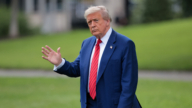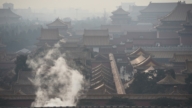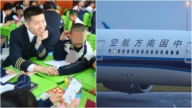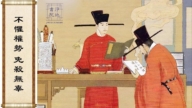【新唐人2013年05月18日讯】据传,中共领导人习近平将在今年晚些时候公布改革计划,并且为今后十年的发展制定日程。在天津考察的习近平强调,为保持中国社会经济发展良好势头,需要进一步深化改革,而保障和改善民生,是习近平强调的重点。不过外界认为,这种不与政治体制改革同步进行的跛足经济,已经证明是死路一条。
喉舌媒体报导,习近平在天津考察工作时强调,加强和改善党的领导,是实现经济社会持续健康发展的根本保障。习近平说,保持中国经济社会发展良好势头,实现所谓“两个一百年”奋斗目标,都需要进一步深化改革,下大力气解决体制机制弊端。
同时,总理李克强也表示,依靠政府投资和刺激取得经济发展的空间已经不大,要激发市场机制的动力,转变政府职能,推动经济转型。
但是,中国的经济增长开始放缓,社会出现贫富分化,利益冲突频发,中国如何摆脱经济与社会困境,急需领导人找出突破口。
“英国广播公司”《BBC》引述部分消息人士的警告说,有关改革会受到利益集团,特别是国企的抵制。
北京《国情内参》首席研究员巩胜利:“现在重提改革,经济改革已经到底了,一党之下,全军从政治经济文化所有的产业都被独家垄断、独家资源占有、独家的霸道,光说没有用啊,胡温执政十年,温家宝死都不明目,但改革走到哪里了?大家都看得到啊!现在的中国改革关键是这个党占有的资源太恐怖!份额太大,以至于老百姓的利益没有人过问。”
时政评论家蓝述认为,习近平现在重新提起改善民生的老套路,是为了缓和中国尖锐的社会矛盾,来延续中共的统治。
时政评论家蓝述:“最主要的原因就是中共有特权,党凌驾于一切之上,这个东西不改的话,他没办法去解决中国社会现在这种巨大的贫富差距造成的巨大的官民矛盾,在过去三十年里,中共能够改的实际上它都已经改了,只剩下唯一一个没改的就是它这个政治体制。所以说,他要回去走抓民生的老路,不触动它这个最根本的政治体制问题,他这条路就走不通了。”
蓝述指出,正是这三十年避开政治体制改革的跛足经济,才导致今天如此尖锐的社会矛盾,现在习近平还沿着这条路走,只能是死路一条。
巩胜利:“中国的党政运行成本之高是全球之最。那在这样的环境下,习近平我不知道他怎么样再玩下去?特别是成本问题,包括党的成本、包括维稳成本、包括企业生存的成本、包括政府的运行成本、还有老百姓生存的成本,老百姓生存其实很简单:水、土、气、电、煤,成本都在升高。这种升高对他的压力也很大呀。”
巩胜利指出,不管是法国还是美国,革命成功后,都是把权力归还给了民众,只有中共窃取政权后,把中国的政治资源、经济资源、自然资源全部归共产党一身独揽。
巩胜利:“美国国民生产总值,2012年是15万亿多美元,而中国的国民生产总值只有6万多亿美金。中国花了大量的钱,超过美国一点五倍的钱只生产出来美国一半的财富都不到。”
那么中共的领导是发展了中国的经济,还是捆绑了中国的经济呢﹖
《法国国际广播电台》报导,经济恢复增长的预测因为首季出现的经济放缓迹象,而失去了说服力。由于经济增加的放缓,被视为天之骄子的大学生,对就业前景感到忧虑与无奈。
巩胜利指出,大学生的就业和生存都遇到了新的问题。
采访编辑/刘惠 后制/君卓
Xi Jinping Continues on Road of Crippled Economy
Reportedly, China will release later this year a reform plan
and an agenda on the next-10-year development.
Xi Jinping, the Chinese Communist Party(CCP) leader,
recently proposed to carry out in-depth reform,
in order to keep the momentum of China’s development.
Xi emphasized issues of improving people’s livelihood.
Experts indicate that China’s crippled economy,
which lacks political reform, has proved to be a dead end.
CCP official media have reported that Xi Jinping emphasized
the reinforcement and improvement of CCP leadership.
“This is a fundamental guarantee for the realization of
a healthy development of the economy and society,” he said.
Xi stated that deeper reform and tremendous effort
is needed to solve drawbacks of the system.
This needs to be done to maintain the momentum of
China’s economic and social development,
and to achieve the “Two Centurial”
goals of the Party.
Premier Li Keqiang said that it’s hardly likely that the
economy will be boosted by continuously relying on the
government’s investment and stimulation plan.
He proposed that is needed is revitalizing of the
market mechanism,
and the changing of government functions, along with
the pushing forward of economic restructure.
However, China’s economic growth has fallen.
The rich-poor gap has been widened, there is also
the increasingly frequent occurrence of social conflicts.
How can China pull itself out of the morass?
There is dire need of a solution from CCP leaders.
BBC quoted some sources’ warnings.
It said that relevant reform may be resisted by
interest groups, especially state-owned enterprises.
(Financial think-tank researcher, China) Gong Shengli:
“Now the issue of economic reform is raised again,
but the situation is at the end of its rope.
China is dominated by one Party, which monopolizes
all industries, all resources in areas of politics, economy and culture.
It’s useless to speak and not follow up with action.
10 years ruling of Hu and Wen, only regret left for Wen;
and now, what’s the reality of the promised reform?
As everyone had seen, the key issue of the reform
is that this Party has controlled too many resources,
at the end of the day, nobody attends to
the business of citizens.”
Critic Lan Shu says that Xi put forth the issue of
improving people’s livelihood, which is a routine CCP line.
He used it to reduce social conflicts and
prolong the CCP’s rule.
Lan Shu: “The main cause of conflicts is the CCP’s privilege,
the Party is above all.
If no change is made, Xi has no way to solve the huge
conflicts that exist between the regime and citizens.
These conflicts were caused by the tremendous gap
between the rich and the poor.
In the past 30 years, the CCP has changed all it can change,
only leaving its political system unchanged.
So if he wants to go back to raising the issue of livelihood,
but bypass the core issue—
that is, changing the political system,
he has no way to go ahead.”
Lan Shu interprets that China has developed a crippled
economy in the past 30 years, for avoiding of political reform.
This is the cause that there are continual and
serious social conflicts today.
So, currently Xi’s route is actually a dead end.
Gong Shengli: “The costs for running the CCP
and its government are the highest in the world.
So I can’t imagine how Xi Jinping will be able to manage
continuing along that same road.
In particular, the issue of cost figures, that includes the
cost of the Party’s operation, of maintaining stability,
of business survival, of running the government,
and also the cost of living.
Simply as: water, land, heating, gas, electricity, coal,
which have all increased in price.
Rising costs directly impact their day-to-day lives.”
Gong Shengli points out that in France or the USA,
after the revolutions succeeded,
both regimes use the power to serve their people.
Only the CCP, after taking power, has controlled
everything in politics and the economy,
not failing to miss out on control of
all natural resources.
Gong Shengli: “In 2012, the US GDP was over 15 trillion
dollars, whilst China’s was only over 6 trillion dollars.
That is, at huge expenses, the wealth produced in China
was less than half that of American citizens.”
Has the CCP leadership developed China’s economy
or has it restrained it?
Radio France Internationale said that economic slowdown
in the first quarter has invalidated the forecast
that China’s economic growth will return.
The weakening economy has made college graduates
feel worried and helpless in finding jobs, said the news.
Gong Shengli remarks that China’s college students now
face new problems in finding jobs and in their survival.


